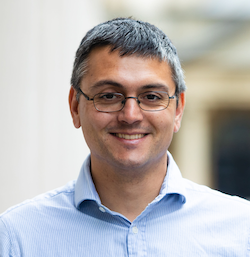 The 5G revolution is accelerating and supercharged wireless connectivity is now a reality for resellers wanting to generate revenue in niche verticals and plug mobile not-spots, says Telet Research CCO Dr. Peter Gradwell.
The 5G revolution is accelerating and supercharged wireless connectivity is now a reality for resellers wanting to generate revenue in niche verticals and plug mobile not-spots, says Telet Research CCO Dr. Peter Gradwell.
Gradwell’s primary focus is to help Telet drive the commercial deployment of private 5G and enable channel partners to address fresh opportunities in plugging mobile not-spots and specialising in specific verticals. As a mobile network technology, he says 5G is well suited to provide high quality wireless bandwidth outdoors across a large area, up to a few kilometers. “We’re looking for partners, particularly those deploying fibre and-or servicing business parks and event spaces where they have a problem getting high quality Internet for the final 1,000 meters,” he said. “Our plan is to provide coverage to 2,000 holiday parks, farms, marinas and show grounds in the next four to five years. That’s circa 250,000 subscribers.”
Telet Research was established by CEO James Body and Network Director Andy Smith in 2016. They’d previously completed a career in the Royal Signals and were part of the founding team of the Truphone mobile venture. Telet was catalysed when Body, who lives in the Chalke Valley, lacked a mobile reception. And because mobile towers and thatched countryside cottages are not ideal bedfellows he sought a solution. This led to Telet winning a UK R&D grant to build an alternative mobile network in the Chalke Valley, near Salisbury.
Our plan is to provide coverage to 2,000 holiday parks, farms, marinas and show grounds in the next four to five years. That’s circa 250,000 subscribers
“The grant allowed us to build out our vision of filling mobile not-spots,” added Gradwell. “Too many people suffer from a lack of coverage and capacity in their mobile service and we believe they would be best served by building or pole mounted small cells that fill in the gaps, with single cells serving all operators to ensure equality. We’ve won further contracts and this year will go live with 5G networks in Bath, Shrewsbury, Cardiff, Liverpool, Worcester and Lancashire. At the moment we are mainly deploying Fixed-Wireless Internet for consumers in fibre not-spots.”
Commercial focus
Gradwell joined in 2021 to help commercialise the business having closed the book on his own venture, turning a new page both professionally and personally. “At the end of 2019 I transitioned out of Gradwell Communications which I founded and worked on 24x7 for 20-plus years,” he commented. “I shortly found myself, as everyone did, locked in the garden and unemployed with two young children. I underwent an identity crisis and I’m grateful for the support I received from family and colleagues to help create the next venture and find the right balance in life.”
He established Gradwell Communications in 1998 and having settled in a new PE majority owner started up IQ Mobile (a UK B2B MVNO) before joining Telet in 2021. “With two self-employed parents, it seemed obvious to me that I should start my own of company,” said Gradwell, whose father is one of the original UK database architects and had his hand in the design of many of the original SQL databases that are used by big UK institutions. So Gradwell grew up surrounded by diagrams and went on to study software engineering in Aberystwyth followed by a PhD at Bath University.
Telet’s pedigree is also impressive. The company is privately funded, has grown to a team of 15 people and is exiting R&D mode with pilot deployments. Its next phase of development will display a strong focus on sales and customer operations and Gradwell expects headcount to reach 200 servicing 2,000 deployments of 5G for businesses. “We’ve already brought our first commercial customers online and we’re actively building 5G networks in four major cities to go live later this summer,” commented Gradwell.
As well as being focused on 5G technologies Telet is also keeping a sharp eye on the evolving regulatory landscape. “We don’t think the Shared Rural Network will meet its roll out goals and there will be a follow on initiative – hopefully more grass roots,” explained Gradwell. “We’ve heard a lot of talk around private 5G networks being too complex and expensive compared to Wi-Fi alternatives and living with existing 4G and 5G networks. However, many applications, in farming for example, are moving from a low data semi-autonomous model to a mode where they need to be permanently connected and uploading large amounts of data. We’re concentrating on cost reduction and simplification.”
According to Gradwell, Ofcom was ‘previously asleep at the wheel’ on coverage and spectrum reuse but is now taking steps to properly understand the level of service that can be accessed. Against this regulatory backdrop Gradwell also pointed out that the USA takes a very different approach to private 4G and 5G networks called CBRS.
“You can buy a $1,000 radio and a $100 per year licence and off you go within an hour,” he commented. “In the UK it’s a £10,000 radio, an £800 per year licence and the application process can take up to ten weeks. I was involved in the move from BT’s and C&W’s duopoly to over 1,000 voice providers, and 10 broadband operators to hundreds. We still have four mobile networks.”
